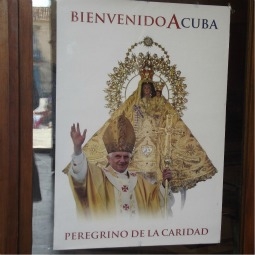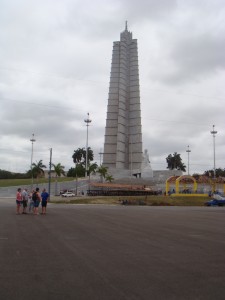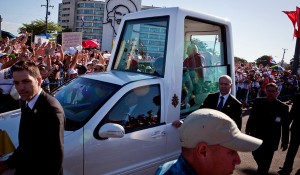Viva Cuba! Viva el Papa!
April 9, 2012 by admin
On March 26th, history was made in Cuba with the arrival of Pope Benedict XVI. In total, this visit marked only the second time in history that a Pope has come to visit the nation and the first trip for Pope Benedict. Pope Benedict’s predecessor, Pope John Paul II, visited Cuba back in 1998.
Historically speaking, the Catholic Church has not had the smoothest of relations with Cuban government. After the revolution of 1959, Cuba’s growing relationship with the Soviet Union resulted in the adoption of various Marxist policies. More specifically, this included an official state-endorsement of atheism. Consequently, many clergymen and religious figures were forced to flee the island as a result of harsh laws and widespread discrimination. According to “Cuba: What Everyone Needs to Know”, revolutionary opposition to religion was fueled not only by an anticlerical ideology, but moreover reflected the “constant suspicion that independent organizations or organizing of any kind could challenge the hegemony of the state.” [i] As a result, the Catholic Church and its followers remained underground until after the fall of the Soviet Union and a change to the constitution in 1992.
Overall, Pope Benedict XVI spent only three days touring around the country. His journey began on March 26th in Santiago de Cuba and he departed two days later from Havana. As reported by NPR, the Pope’s visit was motivated both by a desire to celebrate the 400th anniversary of the Virgin of Charity (Cuba’s patron saint) as well as a general wish to strengthen relations between the Vatican and the Cuban government. [ii]
During masses delivered in both Santiago and Havana, the Pope urged audiences to strive for ‘authentic freedom’ and promoted greater liberties for the Catholic Church and its Cuban practitioners. At the service held in Revolution Square, Benedict decreed, “Cuba and the world need change, but this will occur only if each one is in a position to seek the truth and chooses the way of love, sowing reconciliation and fraternity.”[iii] Benedict, who has publicly spoken out against Marxism and totalitarianism, walked a fine line between voicing his criticisms whilst still extolling the merits of the country and its citizens. The Pope also made a point to publicly denounce the US embargo, stating that Cubans should not be “hampered by limitations on ‘basic freedoms’ or ‘a lack of material resources, a situation which is worsened when restrictive economic measures, imposed from outside the country, unfairly burden its people.’”[iv]
Though the Pope’s calls for political reform have not been answered, the papacy was successfully able to convince the government to establish Good Friday as a national holiday (this has not occurred since before the revolution). While approximately only 10% of the current population are practicing Catholics, many more hoped that the Pope’s visit would foster greater dialogue and stimulate political changes. As one Cuban shared with a reporter, “Lets hope he brings us prosperity…that’s what we hope for. And friendship not just with America, but the whole world.” [v]
[i] Julia E. Sweig, Cuba: What Everyone Needs to Know (New York: Oxford University Press, 2009), 63.
[ii] “Visiting Cuba, Pope Hope to Renew Vatican Ties,” NPR, March 27, 2012. http://www.npr.org/2012/03/27/149464865/visiting-cuba-pope-hopes-to-renew-vatican-ties
[iii] Girish Gupta, “Pope Tells Havana that Cuba Needs Freedom to Change,” USA Today, March 29, 2012. http://www.usatoday.com/NEWS/usaedition/2012-03-29-Pope-Cuba-29_ST_U.htm
[iv] Randal C. Archibold and Rachel Donadio, “Pope Calls for ‘Authentic Freedom’ in Cuba,” New York Times, March 28, 2012. http://www.nytimes.com/2012/03/29/world/americas/pope-benedict-calls-for-authentic-freedom-in-cuba.html
[v] Dale Hurd, “Dashed Hopes? Cuba Rejects Pope’s Calls for Reform,” CBN News, March 28, 2012. http://www.cbn.com/cbnnews/world/2012/March/Dashed-Hopes-Cuba-Rejects-Popes-Calls-for-Reform/
Leave a Reply
You must be logged in to post a comment.


